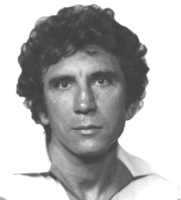 Reinaldo Arenas's Before Night Falls, the gay Cuban writer's memoir, is saturated by death. It is as though, as far as Arenas is concerned, Castro's revolution ushers in a reign of death.
Reinaldo Arenas's Before Night Falls, the gay Cuban writer's memoir, is saturated by death. It is as though, as far as Arenas is concerned, Castro's revolution ushers in a reign of death.Arenas reports that the fighting that preceded the Revolution was little more than a phoney war, "a war of words" whose "battles were more myth than reality" (43): Castro "won a war that had never been fought" (44). The killing, then, begins only once that war is over: "Many more were dying now than during the war that never was" (46).
So we're told a series of stories almost all of which end, either integrally or as an afterthought, with an account of their characters' demise. There's the young man "escorted out of town and shot" for himself killing a young rebel (46). There's Pedro Marinello, director of the course Arenas takes at the university, who "disappeared; he was said to be a CIA agent, the label pinned on anyone who shows any disagreement with Fidel Castro's regime" (66).
There's the Geography professor, Juan Pérez de la Riva, who tries repeatedly to kill himself but just when he had found happiness "got throat cancer; he no longer wanted to die, but die he did" (67). Arenas's lover Miguel "was finally arrested and taken to a UMAP concentration camp. [. . .] I think they killed him at the concentration camp" (70). A Haydée Santamaría "ended up shooting herself" (71) while Héctor, Armando Rodríguez's lover, "died in an accident while riding his motorcycle" (77).
Then the long episode describing Arenas's time confined in the El Morro prison features a series of more or less spectacular demises, from those who jumped off the fortress rooftop to smash themselves to pieces on the rocks below (185) to La Macantaya, guillotined by other prisoners: "the headless body of the queer was discovered three days later because of the stench" (189). Another prisoner, La Maléfica, meanwhile, combines suicide and decapitation, swinging a "sharpened bar round and round and then, turning it with a fast sweep, cut[ting] his own throat. A self-beheading." As Arenas rather dryly adds, "one witnesses such a scene once in a lifetime" (191).
But in fact he witnesses innumerable such scenes, such as the murder of Cara de Buey, stabbed in the back in the prison kitchen (194), or what happened to the boy nicknamed "El Niño," killed while he slept by someone shoving "a metal rod into his back and it came out through his stomach" (195).
Through all this, somewhat ironically, the one person who seems unable to die is Arenas himself, despite attempting suicide once by taking a quantity of pills ("the doctor told me it was a miracle I was alive" [179]) and once by hanging himself on the end of his bed board ("the same prison doctor [. . .] told me, 'You're out of luck, you failed again'" [200]).
Arenas emerges as the great survivor, while all around him is death and destruction.
Of course, Before Night Falls was written in the shadow of Arenas's own death, as his health declined from AIDS, and shortly before he finally (successfully) killed himself, in New York, in 1990. It's no great surprise, then, that it should include such a meditation on death and on those who have died before him.
This biographical framing also, therefore, adds extra weight to the link that Arenas establishes between beauty and danger:
Sexual pleasure often exacts a high price; sooner or later we pay with years of sorrow for every moment of pleasure. It's not God's vengeance but that of the Devil, the enemy of everything beautiful. Beauty has always been dangerous. Martí said that everyone who is the bearer of light remains alone; I would say that anyone who takes part in certain acts of beauty is eventually destroyed. Humanity in general does not tolerate beauty, perhaps because we cannot live without it; the horror of ugliness advances day by day at an ever-increasing pace. (194)Putting to one side, therefore, Arenas's controversial anti-Castro stance, what's interesting is the way in which he here raises his own (and others') suffering at the hands of the Cuban regime to the level of a cosmic struggle between the Devil and beauty.
Beauty is precious and endangered: El Niño is killed because of his pristine innocence, his "face where terror had not yet left its mark" (194). Beauty is easily crushed by the restrictions of politics and confinement: "prison is a monstrosity where love turns into bestiality" (187).
Though his life could easily be seen as a tale of tragedy and waste--poverty, imprisonment, censorship, illness, suicide--and though his memoir scarcely flinches from horror, monstrosity, and death, Arenas suggests that these hardships have come from his perpetual struggle for life, for beauty. That he has always rather been true to his "own being's innermost desires" than be "a poor, resigned creature full of frustrations with no urge for rebellion" (197).
And that, in the end, his has been a life well lived.
No comments:
Post a Comment